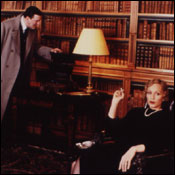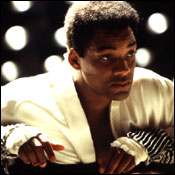Forget the preening parade of celebrities in Ocean’s Eleven. For a truly stellar cast, the movie to see is Robert Altman’s Gosford Park. The luminaries in his new film don’t simply strut their stuff and act cool. Instead, they give

Drawing-Room Drama: Stephen Fry and Kristin Scott Thomas. themselves over to their roles with the kind of simultaneous practiced care and abandon that only actors with full faith in their director would dare attempt. As with many of Altman’s large-scale ensemble pieces, Gosford Park, set at an English country estate during a drizzly November weekend in 1932, is a love affair between performer and filmmaker. The director shows off his ardor by eliciting from his actors aspects of their gifts that they themselves may not have known they had.
What is unusual, and most surprising, about Gosford Park is that, although it teems with characters, it isn’t yet another Altman “party.” Many of us, including perhaps Altman himself, have had enough of those shindigs: For every masterpiece like Nashville, there were three that looked to be far more entertaining for the on-set caterer than for the audience. A bigger surprise is that even though the film, in its particulars, is a whodunit of the Agatha Christie variety, Altman is not, for a change, overtly subverting a genre. What he and screenwriter Julian Fellowes (working from an idea by Altman and Bob Balaban) do is not so much upend a form as deepen it (which in the end amounts to the same thing). Gosford Park delivers the nuts and bolts of the murder-mystery-in-a-country-estate plot while providing much richer satisfactions. Altman is a supreme artist-joker, and the jest this time is that the most American of film directors has given us a finely wrought British whodunit with the emotional layering of a first-rate novel.
Altman introduces his characters with a deft insouciance. Through all the cross talk and verbal throwaways, we still register exactly what he wants us to see and hear. His approach takes some of the starch out of the standard murder-mystery form, where red herrings are provided every quarter-hour for our delectation and everything seems to be set up purely for the sake of puzzlement. The pleasures of gamesmanship are certainly apparent in Gosford Park; it’s just that the game isn’t the final meaning of the drama but only its starting point.
Sir William McCordle (Michael Gambon), the estate’s owner, is the obvious candidate to be offed: During an extended stayover for a shooting party, there are any number of invited guests, relatives, and servants who have reason to do him in. McCordle is so rancorously full of life that it seems only fitting he should be the target of these pinched, decorous people. The full playlist of characters is too voluminous to be itemized – you’d need a flow chart to track who everybody is in relation to everybody else – but a few of the standouts include, downstairs: Helen Mirren (in the film’s most beautiful performance) as head housekeeper and Eileen Atkins as Mrs. Croft, who runs the kitchen; Alan Bates, as the impeccable head manservant, with hair that seems bootblacked; Derek Jacobi as Sir William’s valet and Clive Owen, croupier-cool, as a visiting lord’s valet; and Emily Watson as the head housemaid, who is having an affair with Sir William that actually seems as much about love as exploitation. Upstairs, there’s Kristin Scott Thomas’s Lady Sylvia, wife of Sir William and an ineffable snoot; Jeremy Northam’s Ivor Novello, the real-life English matinee idol who croons darling ditties at the piano with unembarrassed panache; and Maggie Smith as Lady Sylvia’s aunt Constance, for whom desiccation seems the height of style. (She calms her eyelids with cucumber slices and tut-tuts about how the color green is “difficult.”) Bob Balaban plays a friend of Novello’s who’s also the Hollywood producer of Charlie Chan movies; he’s preparing Charlie Chan in London while at the estate, providing a pulp counterpoint to the elegant drawing-room murder scenario.
In its broadest outlines, Gosford Park is a comedy of manners, but Altman doesn’t punch up the disparities between upstairs and downstairs. Instead, he intricately outlines the inner workings of the estate and allows the class meanings to arise from the material. And so, for example, we see how the seating arrangement of the gentry in the dining room, with its carefully orchestrated positions of power, is replicated in the servant’s eating quarters, with the head butler presiding at the head of that table. The film is ostensibly shot from the help’s point of view – we’re rarely taken upstairs without a servant in attendance – but the world before our eyes is shown whole and without rancor.
In the past, Altman has sometimes demonstrated a livid flair for condescension in his social canvasses – A Wedding or Health – but he brings an equable, accepting temperament to Gosford Park: It’s one of his most emotionally generous achievements. We don’t need to be told that the way of life on view is both stifling in its class demarcations and oddly, sadly beautiful, or that this world will soon vanish like the vaporings of Empire. The murder in this film closes out not only a life but an era.

Triumph of the Will: Will Smith in Ali. Ali, directed by Michael Mann and starring Will Smith, purports to be about more than Muhammad Ali or boxing. It’s meant to be taken as a full-scale portrait of growing up black in America. Nothing if not ambitious, it spans the period between 1964, when Ali – then Cassius Clay – beat Sonny Liston for the heavyweight title, through 1974, when Ali regained the title from George Foreman in Zaire after being barred from fighting for refusing induction into the Army during the Vietnam War. What with Ali’s involvement in the Nation of Islam, the assassination of Malcolm X, and Ali’s several marriages – not to mention Howard Cosell’s toupee – this is a lot of ground to cover.
Biopics, however panoramic in scope, usually boil down to a greatest-hits collection, and Ali, for all its Michael Mannerist longueurs and high-flying stylishness, is no exception. (Ali’s training jog through the streets of Kinshasa, Zaire, practically turns into a production number.) What are we getting from Ali that we don’t already know? The documentary When We Were Kings, which covers the Foreman fight, was an unmatchable album of Ali the athlete and avenging trickster. Such writers as Norman Mailer, David Remnick, and Wilfrid Sheed have given us Ali in all his shimmering contradictions; you get more of a sense of the totality of the fighter from these writers than you do from anything in Mann’s movie, which presents Ali as a righteous Everyman who refused to play by the rules of white society, or, really, of any. Will Smith makes a dynamic Ali – he sounds like him and moves like him, both in and out of the ring – but he’s unrelentingly feral. Even when he’s taunting his opponents or Howard Cosell (Jon Voight, entombed in heavy makeup), his Ali is never far from rage.
Mann, who co-wrote the script with Stephen J. Rivele, Christopher Wilkinson, Gregory Howard, and Eric Roth, is caught in a conceptual bind: He wants to show an Ali who is brutally unyielding in his determination to be his own man – a son-of-a-bitch Raging Bull on the world stage – and yet Mann isn’t immune to hagiography. It’s an understandable conflict. Ali, after all, more so than just about anyone of his generation, really did contain multitudes. He could be amazingly cruel and race-baiting to boxers like Floyd Patterson or Ernie Terrell or Joe Frazier who tried to cross him; he could also exalt the everyday with his exploits. Ultimately, Ali is a far more complex creature than this movie allows for. Mann shows us a fighter whose character seems to come out of his very physicality, but missing here are the kind of humanizing insights – any sense of the fear behind the boxer’s bravado, for example – that might lift Ali out of the history books or the sports pages and into the realm of common experience. Even resistance leaders occasionally let their guard down. The Ali in this movie never really does.
Before commenting on The Lord of the Rings, let me admit up front that J.R.R. Tolkien means about as much to me as Lord of the Dance, and Frodo could just as well be Toto (or Fredo). That said, Peter Jackson’s movie of the first book of Tolkien’s trilogy, The Fellowship of the Ring, is smashing for much of the way; as a piece of fantasy moviemaking, franchise-style, it beats the bejesus out of Harry Potter. Years ago, Jackson made, among other sicko cheapies, Dead Alive, the funniest and yecchiest gross-out movie ever made; in a sense, all of his movies, including Heavenly Creatures, are horror films: They’re about the repulsiveness of fear. In that spirit, Lord of the Rings is horrifically imaginative, with imagery and (a few too many) computer-generated effects that are closer in scope to, say, Fritz Lang’s Metropolis than to The Mummy and most of what passes for scare pictures these days.
The cast includes Ian Holm as the hobbit Bilbo Baggins, Elijah Wood as his cousin Frodo, Ian McKellen as the cascadingly white-bearded wizard Gandalf the Gray, Christopher Lee (whose eyebrows still thrill) as Saruman, and Cate Blanchett as the elf queen Lady Galadriel. All these actors seem to have been chosen to blend in with the gnarly, paradisiacal visuals; they’re artworks all on their own. Even the film’s absurdities – such as the way Liv Tyler’s radiant elf Arwen speaks Elvish as though it were some kind of pidgin Finnish – are endearing. But things eventually wear down; Jackson piles on so many escapades that the film turns into a riot of splatter. Tolkien completists won’t find any of this overkill, but for those uninitiates among us, less is more is still a dictum worth heeding.
Gosford Park
Directed by Robert Altman; starring Maggie Smith, Alan Bates, Michael Gambon, and Helen Mirren.
Ali
Directed by Michael Mann; starring Will Smith and Jamie Foxx.
The Lord of the Rings: The Fellowship of the Ring
Directed by Peter Jackson; starring Elijah Wood, Ian McKellen, and Liv Tyler.
Photographs: Mark Tillie (above), Frank Connor (below).